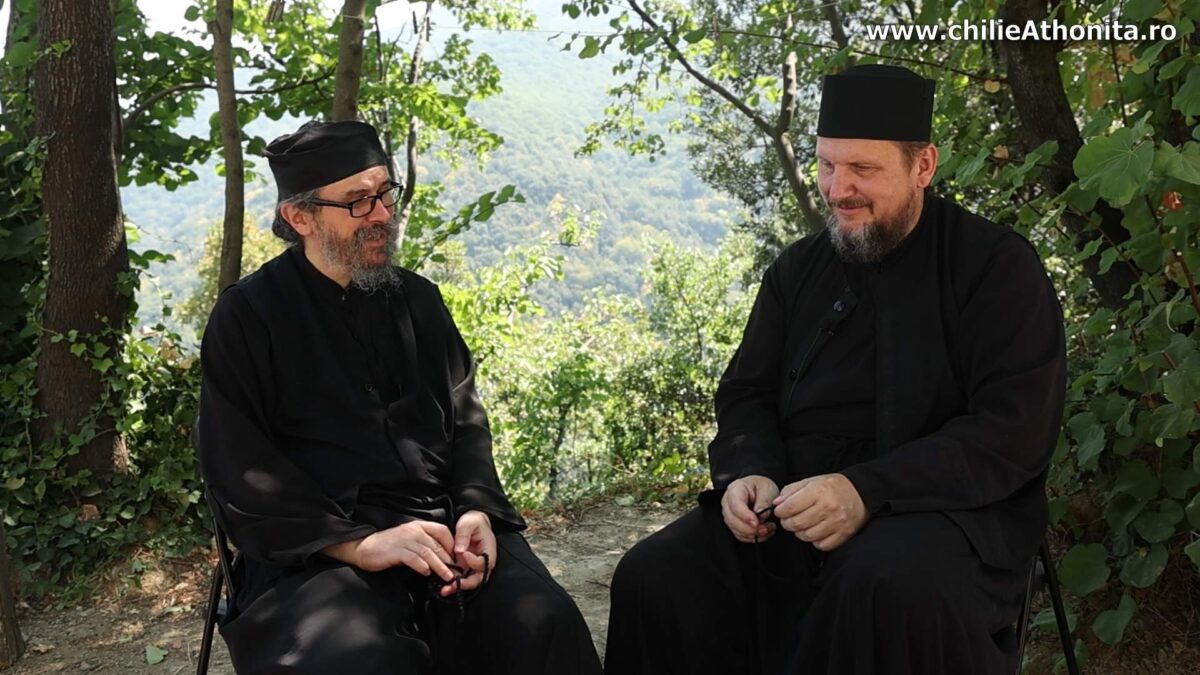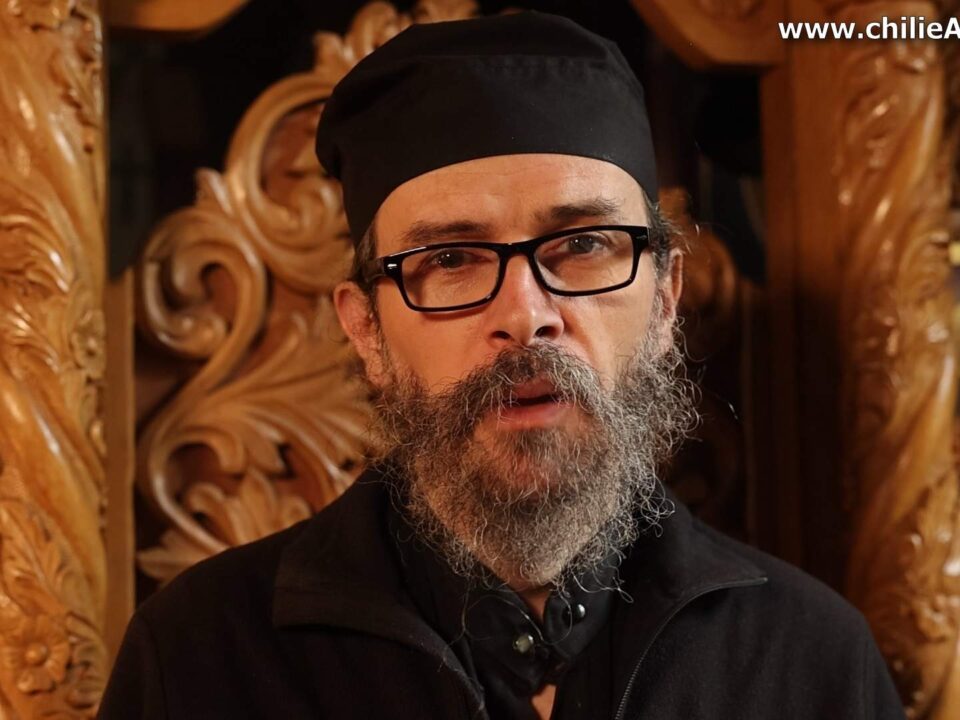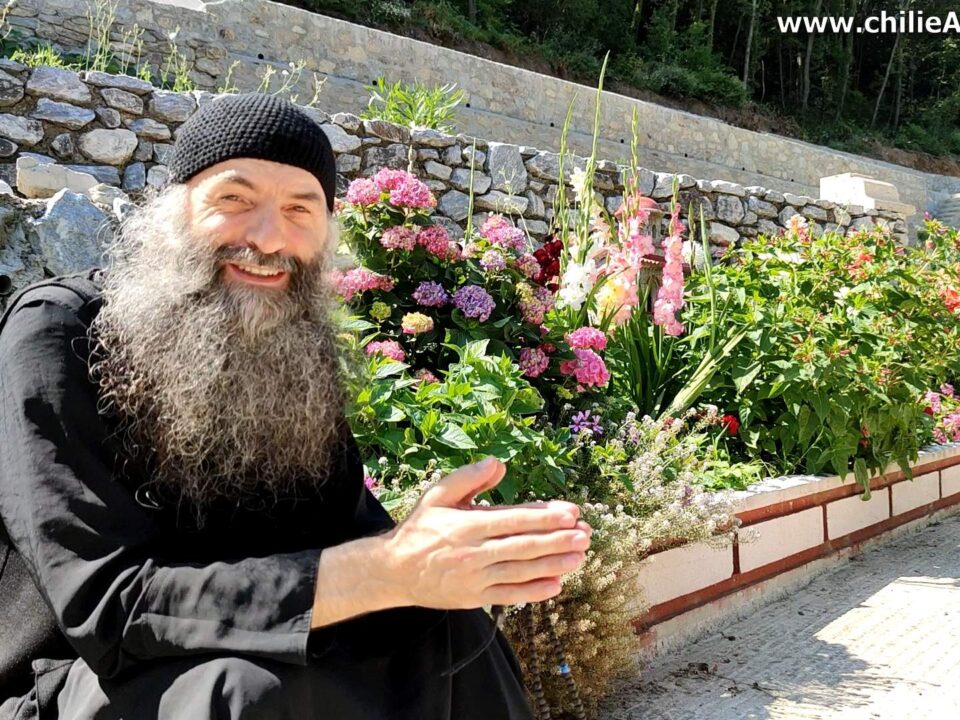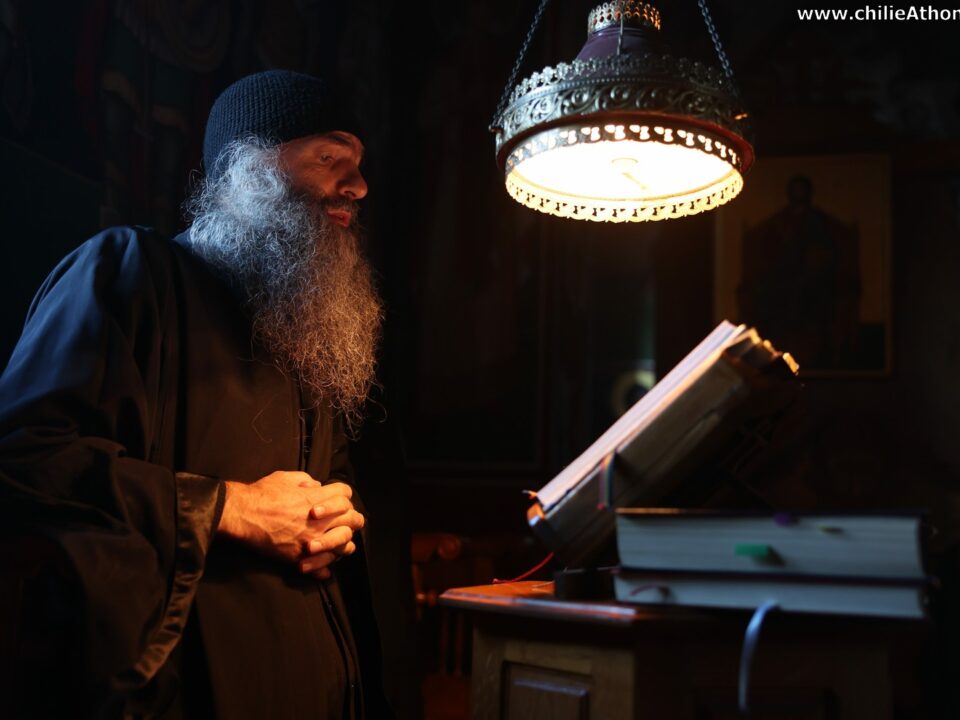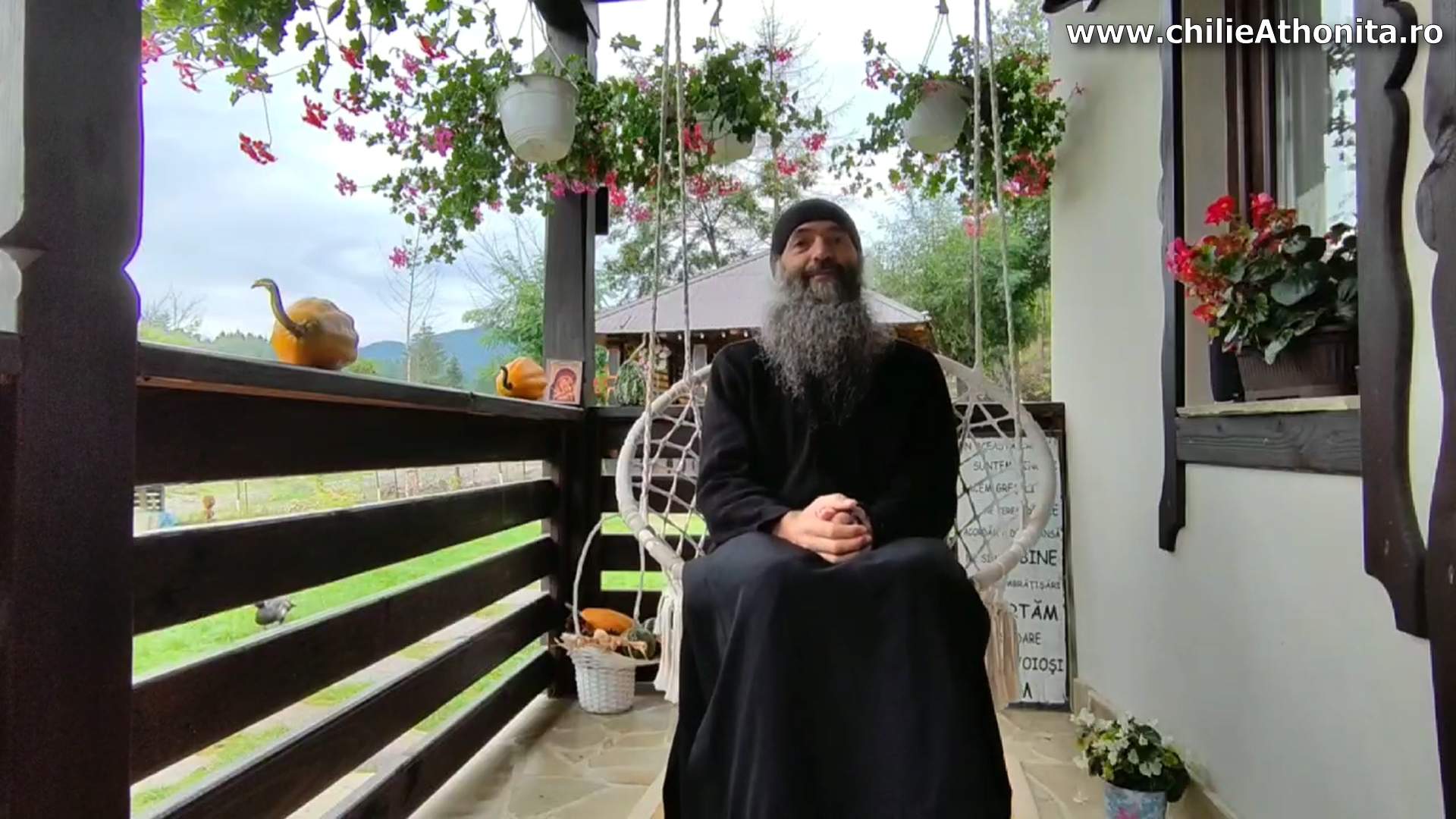
Country Life – Father Pimen Vlad
15 September 2022
The Bravery of Repentance – Father Theologos
21 September 2022Watch a “hot topic” interview with Father Gheorghe Zugravu, ministering priest of St. George’s Orthodox Cathedral in Hartford, Connecticut, USA, in which he gives us up-to-date spiritual information about the specifics of US Orthodoxy and English-speaking Orthodoxy in general as well as assessments related to the future of Orthodoxy in the diaspora.
Miracles with Father Ephrem from Arizona are also recounted.
Enjoy!
Fr. Theologos: Glory to the Father, and to the Son, and to the Holy Spirit, now and forever and unto the ages and ages. Amen. Through the prayers of our Holy Fathers, Lord Jesus Christ, Son of God, have mercy on us. Amen! Father, your blessing!
Fr. Gheorghe: Lord Jesus Christ blesses everyone and us always, now and forever and ever. Amen.
Fr. Theologos: Dears ones, we are with Father Gheorghe from the United States. I would like to not go into too much detail about where Father Gheorghe is from, at which parish he is at and the history of his parish. In any case, he is a very good father, I tell you so because I love him and what I think you’re interested in is the pulse of the Orthodox Church in the USA. Especially since it is currently the only church in the US that is growing. I say church because normally, other congregations are called improperly churches. It’s not about that.
The Orthodox Church is the only church – I believe in a holy, catholic and apostolic church – but in general, people call churches other congregations, other confessions of faith. It is not, but I said it like this so that you can see that only Orthodoxy is growing, the other congregations are falling sharply.
Fr. Gheorghe, can you tell us what that is based on, what are the factors of the growth of Orthodoxy in the USA and what can the Christian, the priest, do to bring more souls to salvation?
Fr. Gheorghe: Yes, in the U.S. today there is a great blessing because [of] other Christians, from other denominations – Roman Catholics, Protestants or even atheists or nihilists who believe in absolutely nothing. When they come into contact through mass media or social media with the idea of Orthodoxy and begin to read, they are very attracted as to a treasure that is hidden, that they have never heard of in their lives. For example, there is this Roman Catholic person who will be baptized on September 24th…
Fr. Theologos: Glory to the Lord!
Fr. Gheorghe: Yes, in our church and although he was a very faithful Roman Catholic, he discovered, in fact he wanted to get to the clean water of the Spring where it all started. And reading the Holy Fathers, reading various Orthodox books that we’ve offered, they’ve entered into this program of catechesis, in which we help catechumens prepare for at least eight months or a year before being baptized.
It is something that attracts them, the mystery, the Holy Mysteries and everything that the Orthodox Church offers to those Christians that they do not receive through other churches.
Fr. Theologos: Alright, so if a person reads Church history or delves a little deeper into Christianity normally, naturally, he comes to Orthodoxy, right?
Fr. Gheorghe: Yes, because they want, the vast majority of them, to actually find out how our Church began, how long we have been around, what is the relationship between the East and the West, the Roman Catholic Church, the Great Schism of 1054 and then they actually realize that in our country the Holy Scripture and the Holy Tradition are sources of divine revelation, which make a big difference.
Fr. Theologos: Alright, you said that you are helping [catechumens] prepare, it is very interesting and very exemplary – well, I knew this, that it is a training program, a long catechesis, so almost a year.
Fr. Gheorghe: Yes, yes.
Fr. Theologos: So, brethren, it’s not about gaining followers, about votes. The Orthodox Church does not deal with this. What are the main problems and what should catechumens pay attention to when they want to become Orthodox? What are the main stumbling blocks.
Fr. Gheorghe: … There are several, but one of them is to be recalibrated or readapted on the heels of the Orthodox Church in general, not only the Greek or Romanian or Russian [Orthodox Church].
And this is even more so because the Roman Catholic Church has a totally different ecclesiology from ours, not to mention the Protestant Church, and then – especially what we want [is] – to invite them to attend the holy services. There is the laboratory where everything happens, that what we learn in classes and in the catechumenate and this is one thing, it’s theory, but we actually apply during the holy services everything we learn. Number one – what the vast majority of them, even Orthodox Christians who have not practiced, want is to get closer to God, to have mystical experience with Christ.
Fr. Theologos: Yes, so Orthodoxy is first and foremost experience.
Fr. Gheorghe: Experience.
Fr. Theologos: And I think that’s what they see. Because they can read a lot, but they have no experience.
Fr. Gheorghe: As we know, in the West, philosophies, not only Buddhism but all others… It’s a matter of philosophy…. The practice, especially, in the Orthodox Church is so powerful, it particularly attracts this grace of God when they come to the Church.
Fr. Theologos: Does the Western, American society influence the Orthodox and catechumens, so to speak?
Fr. Gheorghe: Of course, because it is the context in which we live. It influenced me too, having lived in America for over 30 years. Being raised under the watch of Father Ilie Cleopa or Father Paisie Olaru, of Father Ioanichie Balan in the Neamţ area and at the Neamţ Monastery where I went to the theological seminary, then being transmuted to American lands… Yes, of course, secularism, materialism, pragmatism, they all have an influence on us. Therefore, it requires a continuous vigil over our soul and mind so that we do not allow ourselves to be carried away by pragmatism, lust for wealth and all the other things that the West brings.
And then let us maintain our Orthodox identity, which is the most important, through the holy services and through the Holy Church.
Fr. Theologos: Yes, so I think the holy services are very important there, right?
Fr. Gheorghe: The services are very important. That is why we, although we are in the cathedral, we always do the Paraklesis of the Virgin Mary every Wednesday evening, the same Friday evening, different services, the Vespers Saturday evening. And we’re also looking for all the important services over the year and during the week to perform them.
As to give opportunities to Christians and the Orthodox people to come and take communion with us through the holy services.
Fr. Theologos: Are people coming?
Fr. Gheorghe: They’re coming and it’s not like it was in Romania… Demographically speaking, there are maybe 10-15 km around our area, they come even from 60-80 km, an hour’s drive.
Fr. Theologos: Glory to the Lord!
Fr. Gheorghe: Those who seek the true and smoothly flowing and pure source of Orthodoxy.
Fr. Theologos: Where are you? Forgive me for asking!
Fr. Gheorghe: We’re in Hardford, Connecticut. It is the insurance capital of the world. That’s where all insurance once was, and still is, so Connecticut State is between Massachusetts and Boston and New York.
Fr. Theologos: There was a famous university there, right?
Fr. Gheorghe: Harvard is a famous university belonging to the State of Massachusetts. We are Hardford. It sounds very similar, but it’s not. And there we are. There is the cathedral of Saint Gheorghe and we have two feasts: Saint George and Saint Nektarios whose relics we have and we have a certain shrine there or a chapel.
Fr. Theologos: Glory to the Lord! Have you noticed some signs of grace, some miracles, have you seen in your life how the Holy Grace helps…?
Fr. Gheorghe: Miracles happen and when it comes to the Chapel and relics of Saint Nektarios, many Christians who were not even Orthodox, hearing about Saint Nektarios and the miracles he works for those who are sick with cancer, came and asked for a prayer, no more, nothing else. A prayer. And a prayer started with a deep sigh from the heart and they came a few months later, after they did some tests and said: Saint Nektarios healed us!
Fr. Theologos: Glory to the Lord! How nice!
Fr. Gheorghe: And there is another way to live the moment when they experienced the miracle – they came to church and said that we want to convert, to come to the Orthodox Church, the true church.
Fr. Theologos: How nice! Glory to the Lord! Does the priest resist? Aren’t you few priests in relation to confession, what is it like?
Fr. Gheorghe: Confession, it is true is very important everywhere. Even here in our parish there was not such an ingrained practice of confession. We started with a few dozen and now we have hundreds of people coming to confession.
Fr. Theologos: Glory to the Lord!
Fr. Gheorghe: We regularly give glory to the good Lord! Us priests, we often have to recharge our spiritual batteries, that’s why I’m on the Holy Mountain and I come every year and we go to the holy places.
Fr. Theologos: Yes, yes.
Fr. Gheorghe: Otherwise we cannot resist. At least in the 12 months of the year, at least 3-4 weeks I go to an Orthodox country where I can charge my batteries and return to be able to pass on [the experience].
We have to be very careful and be watchful day and night to what happens to us. And in the Greek Archdiocese in which I serve, which belongs to the Ecumenical Patriarchate. We have many meetings with priests, meetings which keep us together, and we exchange opinions and strategies on how to bring more people into the church.
Fr. Theologos: Glory to the Lord!
Fr. Gheorghe: But it’s an irony, I don’t even know what to call it. For example, believers from the diaspora, Greek believers, come to church more often than those at home [in Romania].
Fr. Theologos: Really? I think it’s because in the diaspora they realize the value of Orthodoxy.
Fr. Gheorghe: This is how it is and it’s the maintenance not only of faith, but also of national identity, language, culture, everything that means…
Fr. Theologos: I believe that the Church is the main supporter of the nation.
Fr. Gheorghe: Of course! That is why we also have on March 25, Greece’s Independence Day. The Annunciation So there are a lot of things that are woven, so to speak, through the fiber of the Church. In fact, as it has been throughout Greek history.
Fr. Theologos: And not only Greece. And Romanian [history].
Fr. Gheorghe: And Romania’s, of course.
Fr. Theologos: So in all these countries, the backbone of the history of these countries has been the Church. So all these countries – the backbone of the history of these countries has been the Church, because, for example, at this time, in the West there is a dissolution of everything that means nation, of everything that means unity, of everything that means patriotism…
Fr. Gheorghe: That’s right. Yes, and it is important for us, as priests, to come together… and so we have at the deanery at least once a month, and then with His Eminence, the whole Metropolis, and then the whole of America, all nine Metropolises. We gather together, we have different meetings, congresses, presentations…, but the most important thing is how to maintain our Orthodox faith.
Fr. Theologos: My big problem and the hard question: young people – what about young people?
Fr. Gheorghe: Young people in the United States, in the Orthodox Churches – at least in the Greek Orthodox Church – still see a special movement with His Eminence Nicholas and His Eminence Cassian of Canada in which those camps where young people gather are held. We have with us, in the New York and Connecticut area, it’s called “Camp Saint Paul”, where over 160 children come weekly, so they come on Monday and leave on Sunday, and on Sunday the camp closes with the Holy Liturgy.
During the week, in the morning there are the matins and in the evening the vespers; The children among themselves sing the holy services. (The camp lasts) five weeks. So if you multiply five weeks by 160 kids every week, that’s a lot more than the Sunday school in a year. We don’t have phones, we don’t have computers, we don’t have anything there, we leave everything at home, we just come to… And we have an Orthodox life in the church, it’s called the liturgical hour, and then we problematize ethics, morals: how to maintain our identity in this world.
Fr. Theologos: How to start a family? That’s a big problem.
Fr. Gheorghe: Of course, yes, many of the tutors who take care of the children know each other, and I have even been to the weddings of a few of them and some of them also became priests later. It’s a great, great blessing.
Fr. Theologos: Glory to the Lord! Can you name some Abba, some priests? This is also a personal question of mine, meaning I would very much like to find someone on the Internet, to translate them for the Romanian public. I found Father Josiah B. Trenham.
Fr. Gheorghe: Of course he is a great theologian… There are a lot of them… I think everyone knows about Gheronda Ephraim, Father Ephraim the Philotheite, who founded so many monasteries, those (spiritual) oases.
The most beautiful is St. Anthony’s (monastery) in Arizona, in the desert where you enter and find everything you want… It is a movement – by the way – as people want to buy houses close to the monastery, especially now, with the pandemic, to be as close as possible to God and to participate in a liturgical – we could say – monastic life.
Fr. Theologos: Glory to the Lord! Did you know Father Ephraim?
Fr. Gheorghe: I knew him personally.
Fr. Theologos: What was he like? Tell us a story!
Fr. Gheorghe: I was in New York. Then the Presbytera, my wife,… We had known each other for several years and I saw that he (Father Ephraim) was coming. People would come to confess at St. Nicholas Church, the church in the borough of Flushing, New York, and they would come there… And there was a queue, I would say of at least about 500 people, who were actually waiting for confession.
They had lists, starting at 6:00 in the morning and ending at 21:00-22:00 in the evening. One of the miracles that happened… I got there, not necessarily… although God revealed to me that I might receive blessing for our marriage, which he (Geronda Ephraim) would give us, but I arrived there with a child. He was a cousin… of our engagement godparents… he was from Venezuela, a convert to Orthodoxy, and one of his sisters had AIDS. Both his father and mother, both passed to the Lord, he had another older brother, who at the age of 20 passed to the Lord, also from AIDS. This little child was 12 years old and his uncle (who is now Orthodox) brought him.
He said, “You can come to Father Ephraim for a blessing.” I walked in. I was the translator. I remember when I saw him (Father Ephraim) for the first time: he was small, short, weak, had great strength and graceful energy. Since I went inside, I remained there… Although I had passed through Greece, I had passed through Romania, through many, many monasteries…
Fr. Theologos: So you had experience…
Fr. Gheorghe: I had monastic experience, but (the gheronda) was a great presence. I explained [the situation] to him and he said “well, let’s pray!” He removed the epitrachelion, prayed for about 10-15 minutes, and a little silence followed.
Then he said, “Tell the child he won’t die.”
Fr. Theologos: Glory to the Lord!
Fr. Gheorghe: And God allowed it, and then the child was cured of AIDS. So we’re talking about 1996 when he was still alive. So there were miracles happening before our eyes… (Geronda Ephraim) is the titan – we could say – and then there is Father Paisios of St. Nektarios Monastery in New York… There are many, many theologians, it is hard to say only a few…
Fr. Theologos: Yes, I ask you about a few who have moved you. Glory to the Lord! It is extraordinary because the Church is already beginning to produce fruit, that is, spiritual people.
Fr. Gheorghe: Yes. That’s right. And on American lands God works mysteriously.
Fr. Theologos: Exactly, that’s what I’m saying… I see it’s growing.
Fr. Gheorghe: I remember, I was in Columbia and at one point, I was looking for a professor with whom I could actually do my PhD thesis in Byzantinology combined with Byzantine music. Then came one of the – I think – top three in the world, Professor John Anthony McGuckin, who came from England – although he is Irish by origin – and who came to Columbia University a full professor. I was surprised that, in fact, he had received the grace of the priesthood from Metropolitan Seraphim of Germany, so he had passed through Rohia, he had passed through Romania… God provides…
Fr. Theologos: Serafim Joanta?
Fr. Gheorghe: Serafim Joanta, yes, and when I met him in Columbia, when he came, we were very proud of the Romanian presence in Orthodoxy in the diaspora – a professor of this caliber was going to come to Columbia University…
Fr. Theologos: What sort of teacher is he? What does he teach?
Fr. Gheorghe: He is a Professor of Patristics, Patrology and Byzantinology, working with Oxford. He also received from His Beatitude Daniel the Patriarchal Cross for what he did for the Orthodox Church Romanian, because it is a great honor.
Fr. Theologos: If I search for him on the Internet, will I find him?
Fr. Gheorghe: He is one of the most prolific Orthodox people I have known.
Fr. Theologos: Glory to the Lord! Great joy!
Fr. Gheorghe: Yes. He is a specialist in St. Gregory of Nazianzus… he also has a book written “An Intellectual Biography” of St. Gregory of Nazianzus… (The professor deals with) everything related to patristics and Byzantinology.
Fr. Theologos: It’s gorgeous! It’s delicate! What do you think, how do you see this area of people, of thinkers, moving towards Orthodoxy? They’re not in Orthodoxy yet, but they’re a little more intellectual, so to speak… The peak is Jordan Peterson… What’s going on with this movement? Because a lot of people are greatly influenced by this…
Fr. Gheorghe: Yes, exactly as we talked. So Orthodoxy is also for a simple man, but it is also for the “high class”. I had the honor, especially through Professor John Anthony McGuckin, to meet the other professors of the New Testament, of the Old Testament, of Dogmatics, belonging to other denominations. How attracted they were to what Orthodoxy would offer, not only ritually or liturgically, by going to church. They couldn’t believe their ears when they heard Byzantine theology articulated for the West, especially for America, in which they found answers they couldn’t find all their lives.
Fr. Theologos: I think this is what Orthodoxy has to offer: it will offer a future, it will offer wisdom, it will offer hope…
Fr. Gheorghe: Not only the parents, but our children have a special future, only they must assume Orthodoxy, live it, first and then learn and transmit it from generation to generation, as we have received from the Holy Fathers, the entire Orthodoxy and patristic tradition to continue on American soil.
Fr. Theologos: Amen. Glory to the Father, and to the Son, and to the Holy Spirit, and now and ever and unto the ages and ages. Amen. Lord have mercy, Lord have mercy, Lord have mercy.
Father, your blessing! Fr. Gheorghe: Through the prayers of our Holy Fathers, Lord Jesus Christ, Son of God, have mercy on us! Amen.
Online commemoration lists and donations
May the Lord help us!
Online Commemoration Lists and Donations
May the Lord help us!
If you have a bank card and wish to send commemoration lists and donations online using your card, and/or to support our philanthropic activity, including this site, please fill out the form below to make a small donation. The form is secure – we use Stripe for payment processing – a world leader in this field. We do not collect your personal data.
If you do not have a card, or do not wish to use it, visit the webpage for Online Donations and Commemoration Lists.
We will pray for your loved ones! (Please do not include inessential details like wishes, degree of kinship, introductions etc. JUST the name!)
Especially for recurring commemoration lists, we ask that you please keep them to under 20 names long. If you include a member of the family, we add “and for their families.”


